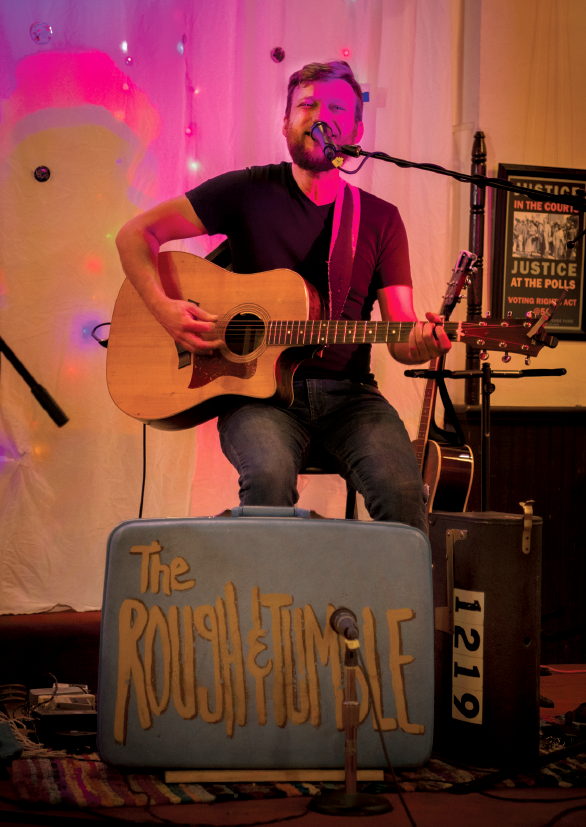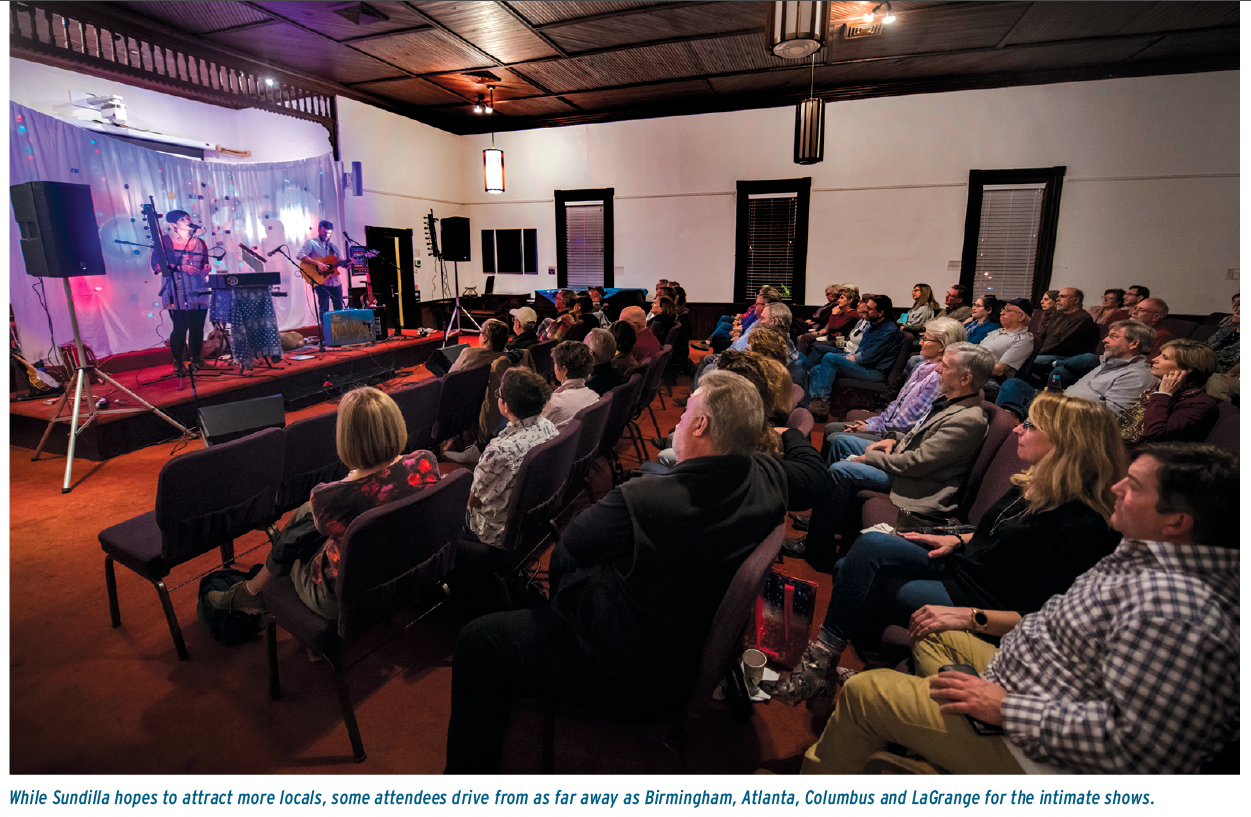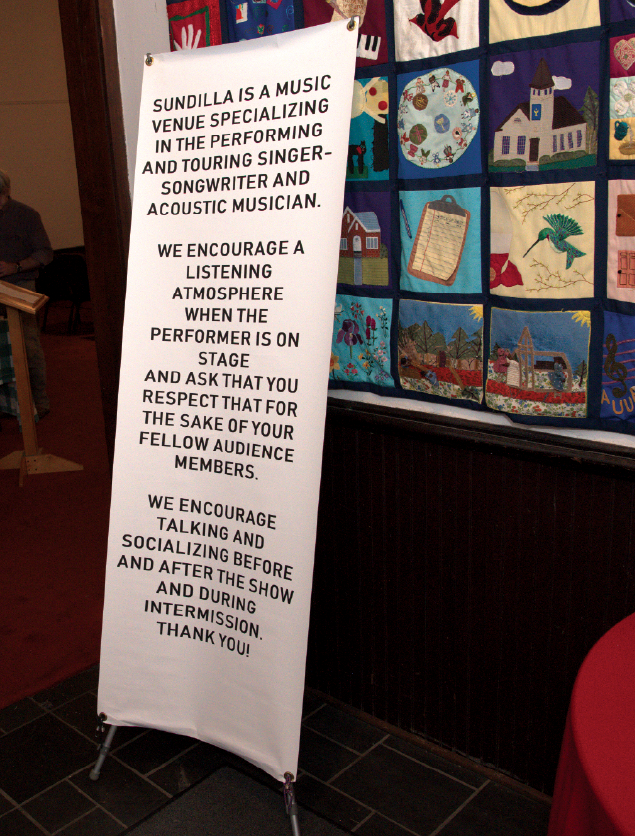By Todd Deery ’90
KATIE LAMAR JACKSON ’82 doesn’t remember the exact date. “I apologize — my memory seems so bad today,” she says. But she remembers the day It was a beautiful, crisp, sunny afternoon in Auburn. Fall of 1994. People had brought blankets, their dogs and picnic baskets and were sitting on the lawn at Pebble Hill in Auburn. Dozens of them. And they were watching underappreciated Alabama songwriter Steve Young sing and play guitar.
Jackson was anxious. For the past several weeks, she and her sister Jay Lamar ’80 had hustled and planned to make the event happen, and now it looked like it was a success. Jackson couldn’t believe it.
“We were shocked that anyone showed up,” Jackson said. “Just stunned. But, I thought, how great it would be if we could do this again?”
Jackson would do this again. And again. And again. Using equal parts luck, ingenuity and determination, she started bringing renowned singer-songwriters from all over the world to the Plains, averaging a dozen or more shows a year. From that sunny day in 1994, Jackson, Lamar and Littleton spawned one of the longest-running and most-respected acoustic concert series in the country.
One that virtually every musician who has strummed a 12-string has played or wanted to play. One that the Folk Alliance International named a special award for contributions to folk music in 2017. One that, despite its success across the country and even the world for almost 25 years, few Auburn people know about.
One they would give the improbable and very memorable name of Sundilla.
A Shoestring Budget without the Shoestring
Jackson wants you to know she’s not a musician. “The only thing I can play is the radio. And I guess Pandora now,” she laughs.
But she is a huge music fan and a writer, having spent more than 25 years working at Auburn, mostly in the communications and marketing department in the College of Agriculture. She also has been a freelance writer for decades. She got the idea for Sundilla while interviewing Young for a magazine article in early 1994 at City Stages, the Birmingham, Ala. music festival.
“Later that year, Steve called me and said, ‘I’m going to be coming back to Alabama and I would love to play in Auburn. Can you suggest some venues for that?’” Jackson said. “At the time, the only venues were pretty much bars. And most of those weren’t ‘listening’ venues.”

Jackson, Lamar and Littleton decided to create a concert where the performer was the focus. Lamar was then the director of the Caroline Marshall Draughon Center at Pebble Hill and booked the lawn. They posted a few fliers around town, and people showed up.
“It’s called being stupid and fearless, I guess,” Jackson laughs. “Just dive right in and go. ‘This would be cool, so let’s try it.’ And then the phone didn’t stop ringing.”
Musicians were starting to call Jackson, because musicians talk when they play a concert series that does things right. They appreciated the Southern hospitality that Sundilla offered and started to spread the news.
Those first few years would establish the reputation of Sundilla that exists to this day. Sundilla treats the artists and the music with respect. Jackson would often let musicians sleep at her house. Volunteers made meals. And on concert nights, Jackson and her growing team would set up all the equipment, leaving the musicians only to worry about playing a great show.
And what about haggling over the box office? The music industry is littered with stories of unscrupulous promoters and venue owners. Not here. Throughout its history, a remarkable 90-100% of the ticket sales would go to the performer, leaving the series just enough money to scrape together the next show.
“It was a shoestring budget without the shoestring,” Jackson said.
Finding appropriate venues was an early obstacle. It was friend and early volunteer Mary Littleton ’88 who suggested they form a 501(c)(3) and approach the local Unitarian church, which is nationally known to partner with local communities. In 1995, they found a new home in the Unitarian Universalist Fellowship Church where most concerts are held to this day (see box below). It would be the perfect match of performance and venue.

Current Sundilla President Bailey Jones ’87 is surprisingly tall and gives off the easygoing vibe of a liberal arts professor. He thinks before he speaks. He seems to stroll when he walks and blends into a crowd effortlessly. So, it’s easy to mistake this thoughtfulness for a lack of passion.
But ask him what he gets out of all the work he does for Sundilla, and he answers excitedly.
“I get the music, and it’s music that I want to hear,” Jones said. “Not what some guy sitting in some office running the radio station wants me to hear.”
It’s the kind of formatless music that used to appear on the radio he heard as a kid while doing laundry near Lake Martin in Alabama.
“We didn’t have a washer or dryer. So, we would take our laundry to the laundromat in Red Hill, Ala. They had the greatest jukebox in the little café next door,” Jones said. “It was the kind of thing you could listen to all day. John Denver would be next to Michael Jackson, who was right next to the O’Jays, who were right next to Elvis. There were no genres. It was all just good music, and that’s kind of what we try to do with Sundilla.”
Jones grew up in Birmingham, attended Samford University for two years, then transferred to Auburn to study, of all things, reptiles and amphibians. While that may sound like a great background for the music business, he soon switched gears, earning two bachelor’s degrees in journalism and radio and television in 1990.
After doing some video and TV work, Jones moved back to Auburn in 1997 and got a job with a snake removal company, a job he says, “is as bad as it sounds.” And seasonal. In 1998, he started volunteering for Sundilla, after reading about it in a local paper. After two shows, he was on board as a permanent volunteer.
In 2001, Jackson asked him to handle booking for Sundilla. And with no experience, he said yes. Turns out, the hardest part of doing bookings was wading through the dozens of musicians who wanted to play. Sundilla’s reputation remained strong.
In 2005, Jackson’s work and personal life were too much to give Sundilla the time it needed, so Jones took over the concert series for good, continuing the legacy that she started.
The Musicians and the Audience
So why the incredible appeal for musicians? Jones said it’s because Sundilla has always been about two things: the musicians and the audience. They are flexible with their dates — if a musician needs to perform on a Tuesday, they can do a Tuesday. They have volunteers who cook for the musicians and provide a warm place to stay.
Another reason is geography. Auburn is close to Atlanta and Birmingham. It’s near I-85 and Highway 280.
“At times it’s been because we were kind of an oasis,” Jones said. “In fact, our unofficial motto for a long time was, ‘We’re a great place to play on your way somewhere else.’”
But attend a show and you’ll see it’s more than that. The Unitarian Universalist Fellowship Church was built in 1865 by freed slaves. It’s a warm space with high ceilings and incredible natural acoustics, and the stage is softly lit and just large enough for a band. Audience members bring fresh-baked cookies and sandwiches to snack on preshow.
Volunteers at a small merch table in the back greet everyone who walks in. Most nights, “Wildman” Steve Bronson, former owner of venerable Auburn record store, Wildman Steve’s Records, does the sound. And when the performance starts, everyone does something amazing: they listen. Going to a Sundilla show feels less like a concert and more like a family reunion with incredible live music.
Southern singer-songwriter Kate Campbell ’86 has put out 18 albums and played with everyone from Emmylou Harris to John Prine. But she notices the same thing when returning to Auburn to play Sundilla, something she’s done four or five times since the late 90s.
“The staff treat us so well, and the audience is not in some bar talking. They are in a listening room and appreciating what you’re doing,” Campbell said. “The place gives off a certain vibe as soon as you arrive for soundcheck. There aren’t many venues like it in the southeast.”
In 2017, the Southeast Regional Folk Alliance (SERFA) awarded the Unitarian Church and Sundilla a SERFA award for major contributions to folk music. According to Jones, they’re the only venue to ever receive the award.

ASK KATIE LAMAR JACKSON OR BAILEY JONES what Sundilla is named after and they both laugh. It’s kind of a long story. And like all long stories, it’s wrapped in a bit of mystery.
But the story goes something like this. The current home of The Sundilla Concert Series is the Auburn Unitarian Universalist Fellowship Church at 450 East Thach Avenue.
That building was originally the Ebenezer Missionary Baptist Church and was the first African American church built in Auburn after the Civil War. It was finished around 1870 by freed slaves using hand-hewn logs transported from miles away by mules.
Before the church was built on the land, the Creek Indians owned it and the man who represented them was named Sundilla. Thus, a concert series was named — so we think.
No matter the origins, Jackson loves the name. “I love the way that it ties back to our local history. The name gives it its own personality.”
“It might be the same as our War Eagle,” Jones says. “The truth might not actually be as good as the story.”
The influence of Sundilla on the local music community is also unmistakable. There are now several smaller, musician-friendly venues around town and a growing community of local players and listeners. The Gogue Performing Arts Center has a full season of shows and concerts, and Opelika this past May held its first Opelika Songwriter’s Festival, which brought in musicians from all over the world. Jones did the booking and landed big names like Dan Navarro and Shawn Mullins as well as a slew of professional musicians and up-and-comers.

For Mark DeGoti, associate professor of trumpet in the Department of Music at Auburn, a live concert series like Sundilla is incomparable to listening to music on the radio or online.
“They [live concerts] are integral to the community and help create a bond and sense of culture in Lee County,” he said. “Seeing musicians perform live helps give the audience a better understanding and appreciation for the work and talent involved in their craft.”
The art of music is further explored in the Sundilla Radio Hour, which features music and conversation with independent, contemporary folk musicians. More than 335 episodes have been produced and are available as podcasts and run on Troy Public Radio.
Despite its success, Jones worries most about the graying of the audience and Sundilla’s difficulty attracting students to its shows. And while the series is known nationally and internationally, it remains largely unknown to many in the Auburn community. For Sundilla to continue to grow, that must change.

“I am proud that some little silly idea that started off on a lark has so sustained and grown into something bigger,” said Jackson. “And I love the idea of supporting artists of any sort—musical, writing, visual, dance—all of those things, so I’m probably proudest that we’ve been able to bring something both to the community and to those performers too.”
Jones, who counts many of the musicians as friends, agrees.
“I’m glad I get to hear so much great music at these events,” Jones said. “Everybody here seems to be enjoying it. So, good for us, good for them and good for the musicians. Most of these people, they couldn’t make a living if they weren’t really nice, really personable, really interesting. Who doesn’t need more friends like that?”
So why the incredible appeal for musicians? Jones said it’s because Sundilla has always been about two things: the musicians and the audience. They are flexible with their dates — if a musician needs to perform on a Tuesday, they can do a Tuesday. They have volunteers who cook for the musicians and provide a warm place to stay.
Another reason is geography. Auburn is close to Atlanta and Birmingham. It’s near I-85 and Highway 280.

We Were CAPERS
From the 1960s to the 1980s, Auburn’s all-female military auxiliary instilled discipline and service, paving the way for future equality in the nation’s armed forces and preparing them for a lifetime of success.
The Antonio Network
Former Auburn football star Antonio Coleman ’08 returned to his old high school as head coach to turn the football program around. Through a unique group of local alumni, the team has started winning off the field, too.
Sharks, Sea Lions and Spreadsheets
Kristen Rosenberger ’10 keeps the National Aquarium swimming in the right direction.
We Were CAPERS
From the 1960s to the 1980s, Auburn’s all-female military auxiliary instilled discipline and service, paving the way for future equality in the nation’s armed forces and preparing them for a lifetime of success.
The Antonio Network
Former Auburn football star Antonio Coleman ’08 returned to his old high school as head coach to turn the football program around. Through a unique group of local alumni, the team has started winning off the field, too.
Sharks, Sea Lions and Spreadsheets
Kristen Rosenberger ’10 keeps the National Aquarium swimming in the right direction.


